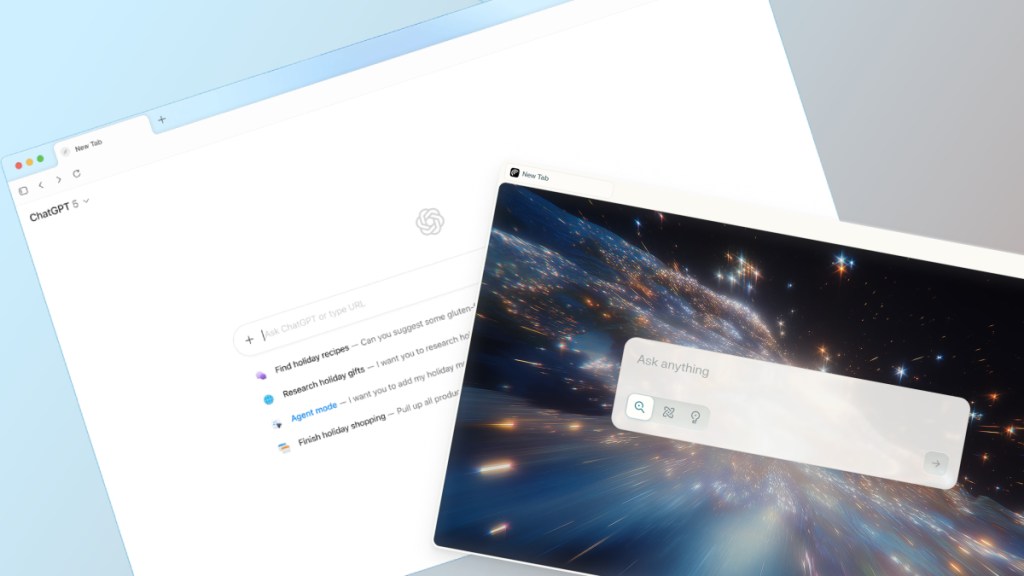OpenAI now has a web browser, and so does Perplexity. Both of them are more than eager to convince you that you need more than just plain web browsing. Both of them insist that you absolutely need their AI to go about your daily workflow. Both of them want you to delete Chrome and try their idea of a modern-day AI-era web browser.
While both are built on Google’s Chromium foundations, they apply embedded AI assistants to assist with your browsing. In other words, they want you to rely more on their AI bot instead of heading first to Google Search. However, both of them have slightly different ideas of an AI web browser and how they can change the way you use the internet.
Hence, without further ado, let’s find out how these AI web browsers compare and whether they can replace your precious Chrome.
ChatGPT Atlas vs Perplexity Comet: Feature comparison
OpenAI describes Atlas as a browser “built entirely around ChatGPT”. You are always greeted by the ChatGPT bot but for the browsing mode, you get a persistent ChatGPT sidebar that allows users to ask questions about the content on any web page, summarise, compare products, or perform analysis. There is also an ‘Agent mode’ that can carry out tasks from start to finish — such as researching a trip, shopping for items, or automating multi-step workflows. The browsing data is, by default, opted out of training the ChatGPT models, and users control the “memory” of browsing insights.
On the other hand, Perplexity describes Comet as an agentic browser that blends AI search, summarisation and task automation built into the browser experience. The browser lets users highlight text, ask deep follow-up questions, explore tangential ideas without losing context, and manage tabs and tasks. Originally available to high-tier subscribers and invite-only, Comet was made free to all users in October 2025, with a paid “Plus” tier for premium features. The browser also supports popular Chrome extensions.
ChatGPT Atlas vs Perplexity Comet: Productivity
If your productivity hinges on doing things (e.g., booking trips, managing complex workflows, automating sequences) then Atlas has an edge – thanks to its Agent mode and tight integration with ChatGPT’s ecosystem. The ability to ask the browser to carry out multi-step tasks could save time and cognitive load.
Comet, meanwhile, shines when it comes to research-intensive or exploration workflows. It can read many articles, branch off tangents, summarise quickly, and stay in context across tabs. It’s excellent for quick information consumption and insight discovery.
ChatGPT Atlas vs Perplexity Comet: Ecosystem
If you already use ChatGPT frequently, Atlas will feel familiar and may integrate more smoothly with your existing work habits. On the other hand, Comet’s free entry is compelling, especially for students, independent researchers or budget-conscious users who want a productivity browser without paying initially for premium subscriptions.
ChatGPT Atlas vs Perplexity Comet: Cost and availability
Perplexity’s Comet wins due to its cost of entry. The free tier is now available to all, which lowers barriers to trying it out. On the other hand, OpenAI’s Atlas requires a paid ChatGPT tier for full Agent mode features, with the free tier only offering basic ChatGPT assistance. Additionally, its availability is starting with macOS only (for now).
ChatGPT Atlas vs Perplexity Comet: Security readiness
Comet has already attracted attention for reported security concerns (prompt-injection, AI agents executing unintended actions) in independent audits. For professional or enterprise productivity, this raises caution. Perplexity is yet to address the issue.
OpenAI, on the other hand, emphasizes privacy controls and is backed by its enterprise profile for Atlas. No major security flaw has been detected yet but that doesn’t mean that Atlas has no major concerns for now.
ChatGPT Atlas vs Perplexity Comet: Conclusion
AI makes life easier, and with either of these web browsers, you can expect your workflows to get slightly easier. The newly launched ChatGPT Atlas seems better suited for those whose productivity design involves automating workflows, reducing manual tasks, and integrating tightly with ChatGPT. Its agent-driven approach and enterprise lean make it suitable for serious, work-critical tasks. Bear in mind the subscription price for ChatGPT’s premium subscription, though.
For those focused on speedy research, exploration, reading, summarising, and lightweight tasks, Perplexity‘s Comet ends up being a better tool. The presence of a free-tier model for all the cool features makes it suitable for students and professionals, unlike Atlas.









